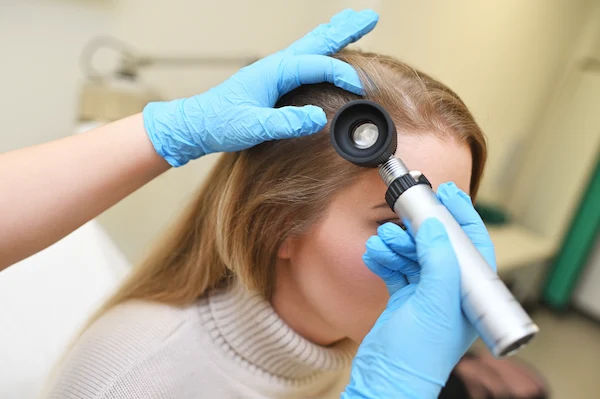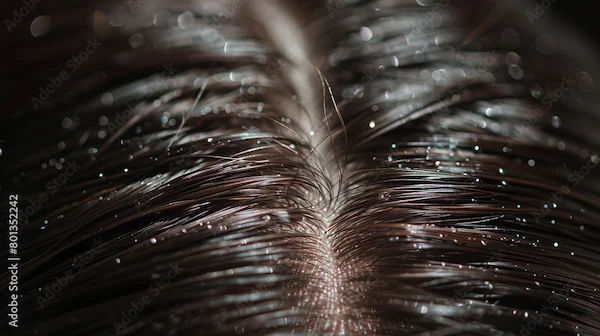How To Increase Sebum Production On Scalp?
Learn how to naturally boost sebum production on your scalp using oils, diet, and gentle hair care routines. Restore moisture balance for healthier hair and scalp.

Written by Dr.Sonia Bhatt
Last updated on 3rd Jul, 2025

Introduction
A healthy scalp is the foundation of strong, shiny hair. Sebum, the natural oil produced by your scalp, plays a crucial role in keeping your hair moisturized and protected. However, some people experience low sebum production, leading to dryness, itchiness, and brittle hair. If you're struggling with a dry scalp, this article will help you understand how to boost sebum production naturally and maintain a healthy scalp.
What is Sebum and Why is it Important?
Sebum is an oily, waxy substance secreted by the sebaceous glands in your scalp. It acts as a natural conditioner, keeping your hair soft, shiny, and protected from environmental damage. Sebum also helps maintain the scalp's moisture balance and prevents excessive dryness or flakiness.
Signs of Low Sebum Production
If your scalp isn’t producing enough sebum, you may notice:
Dry, flaky scalp
Itchiness and irritation
Dull, brittle hair
Increased hair breakage
Slow hair growth
Causes of Low Sebum Production
Several factors can reduce sebum production, including:
Overwashing hair: Frequent shampooing strips away natural oils.
Harsh hair products: Sulfates and alcohol-based products can dry out the scalp.
Hormonal imbalances: Conditions like hypothyroidism or menopause can affect oil production.
Aging: Sebum production decreases with age.
Dietary deficiencies: Lack of essential fatty acids and vitamins can impact oil secretion.
Natural Ways to Increase Sebum Production
Sebum is the natural oil produced by your skin that helps keep hair and scalp moisturized, and there are several natural ways to encourage its production if it's lacking.
1. Reduce Hair Washing Frequency
Washing your hair too often removes natural oils, signaling your scalp to produce even less sebum. Try washing your hair 2-3 times a week instead of daily. If your hair feels greasy in between washes, use a dry shampoo or rinse with water only.
2. Use a Gentle, Sulfate-Free Shampoo
Harsh shampoos strip away sebum, leaving your scalp dry. Opt for mild, sulfate-free shampoos that cleanse without over-drying. Look for ingredients like:
Aloe vera
Coconut oil
Jojoba oil
Consult Top Dermatologists
3. Massage Your Scalp Regularly
A gentle scalp massage stimulates blood circulation and encourages sebum production. Use your fingertips (not nails) to massage in circular motions for 5-10 minutes daily. You can also use natural oils like:
Coconut oil: Deeply moisturizes the scalp.
Jojoba oil: Mimics natural sebum, balancing oil production.
Olive oil: Nourishes and softens hair.
4. Eat a Balanced Diet
Your diet directly affects sebum production. Include these nutrients for a healthier scalp:
Omega-3 fatty acids (found in fish, flaxseeds, walnuts): Support oil production.
Vitamin A (sweet potatoes, carrots, spinach): Promotes sebum secretion.
Zinc (nuts, seeds, legumes): Helps regulate oil glands.
Biotin (eggs, almonds, avocados): Strengthens hair follicles.
5. Stay Hydrated
Dehydration can lead to a dry scalp. Drink at least 8 glasses of water daily to maintain moisture balance.
6. Avoid Excessive Heat Styling
Blow dryers, straighteners, and curling irons can dry out your scalp. Limit heat styling and use a heat protectant spray when necessary.
7. Try a Natural Scalp Mask
A weekly scalp treatment can help restore moisture. Try this DIY mask:
1 tbsp coconut oil + 1 tbsp honey + 1 egg yolk
Apply to the scalp, leave for 20 minutes, then rinse with lukewarm water.
When to See a Doctor?
If home remedies don’t improve your scalp condition, consult a dermatologist. You may have an underlying issue like:
Seborrheic dermatitis (flaky, inflamed scalp)
Hypothyroidism (low thyroid hormone affecting oil glands)
Nutritional deficiencies
Conclusion
A healthy scalp requires balanced sebum production. By adjusting your hair care routine, eating a nutrient-rich diet, and keeping your scalp moisturized, you can naturally boost sebum levels and enjoy softer, stronger hair.
If you're experiencing persistent dryness or hair loss, consider consulting a dermatologist. You can book an appointment with Apollo 24|7 for expert advice and personalized treatment options.
Consult Top Dermatologists
Consult Top Dermatologists
Dr. Kavitha Killaparthy
Dermatologist
23 Years • MBBS,DIPLOMA(DERMATOLOGY,VENEREOLOGY,LEPROSY)
Hyderabad
JDS Skin & Hair Clinic, Hyderabad
Dr. Mayuri Jain
Dermatologist
11 Years • MBBS, MD Dermatology , Venereology & Leprosy
Delhi
Dr Mayuri Jain Clinic, Delhi

Dr Ekansh Shekhar
Dermatologist
10 Years • MBBS MD
Lucknow
Apollo Clinic Hazratganj, Lucknow
Dr.j Girishma
Dermatologist
6 Years • MBBS MD DERMATOLOGY
Bengaluru
Apollo Medical Center, Marathahalli, Bengaluru
Dr. Praveen Kumar
Dermatologist
5 Years • MBBS, MD DVL
Yenugonda
SVS Hospital ., Yenugonda
Consult Top Dermatologists
Dr. Kavitha Killaparthy
Dermatologist
23 Years • MBBS,DIPLOMA(DERMATOLOGY,VENEREOLOGY,LEPROSY)
Hyderabad
JDS Skin & Hair Clinic, Hyderabad
Dr. Mayuri Jain
Dermatologist
11 Years • MBBS, MD Dermatology , Venereology & Leprosy
Delhi
Dr Mayuri Jain Clinic, Delhi

Dr Ekansh Shekhar
Dermatologist
10 Years • MBBS MD
Lucknow
Apollo Clinic Hazratganj, Lucknow
Dr.j Girishma
Dermatologist
6 Years • MBBS MD DERMATOLOGY
Bengaluru
Apollo Medical Center, Marathahalli, Bengaluru
Dr. Praveen Kumar
Dermatologist
5 Years • MBBS, MD DVL
Yenugonda
SVS Hospital ., Yenugonda



